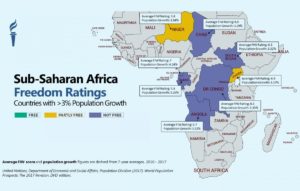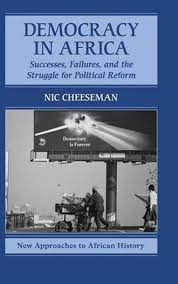 African democracy is in for a bumpy 2019, with the continent’s political trajectory moving in the wrong direction, according to analysts Nic Cheeseman and Jeffrey Smith. In Tanzania, President John Magufuli has clamped down on the opposition and censored the media. His Zambian counterpart, President Edgar Lungu, recently arrested the main opposition leader on trumped-up charges of treason and is seeking to extend his stay in power to a third term. This reflects a broader trend.
African democracy is in for a bumpy 2019, with the continent’s political trajectory moving in the wrong direction, according to analysts Nic Cheeseman and Jeffrey Smith. In Tanzania, President John Magufuli has clamped down on the opposition and censored the media. His Zambian counterpart, President Edgar Lungu, recently arrested the main opposition leader on trumped-up charges of treason and is seeking to extend his stay in power to a third term. This reflects a broader trend.
Sub-Saharan Africa and Asia saw slight improvements in 2018, according to the latest EIU Democracy Index.
 But according to Freedom House, just 11 percent of the continent is politically “free,” and the average level of democracy, understood as respect for political rights and civil liberties, fell in each of the last 14 years, Cheeseman – author of Democracy in Africa – and Smith add. The Ibrahim Index of African Governance shows that democratic progress lags far behind citizens’ expectations. The vast majority of Africans want to live in a democracy, but the proportion who believe they actually do falls almost every year, they write for Foreign Affairs:
But according to Freedom House, just 11 percent of the continent is politically “free,” and the average level of democracy, understood as respect for political rights and civil liberties, fell in each of the last 14 years, Cheeseman – author of Democracy in Africa – and Smith add. The Ibrahim Index of African Governance shows that democratic progress lags far behind citizens’ expectations. The vast majority of Africans want to live in a democracy, but the proportion who believe they actually do falls almost every year, they write for Foreign Affairs:
A level playing field is vital for democracy to flourish. In many countries across Africa, it is alarmingly tilted. Of course, sham elections are nothing new in Africa, but for a while things were going in the right direction. Today, however, democracy is in danger of collapsing in places where it has until recently been fairly secure. Senegal, long one of Africa’s most free and open societies, will hold a presidential election this year amid growing government repression of the opposition. The political temperature is also rising in Malawi, where in May, the 78-year-old president will face both a former head of state and his current vice president, who broke ranks with the ruling party over unresolved corruption and governance-related issues. RTWT
Alex Magaisa shows that the competitive authoritarian system created by dictator Robert Mugabe has endured through Zimbabwe’s first post-Mugabe elections, in an article for the NED’s Journal of Democracy.







